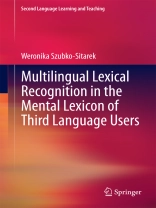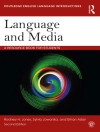The monograph constitutes an attempt to demonstrate that trilinguals should be considered as learners and speakers in their own right as opposed to L2 learners with a view to enumerating consequences this would bring to third or additional language teaching. Its theoretical part offers an insight into the structure of the multilingual mental lexicon which is a product of the interplay of a whole array of cross-linguistic factors in the minds of multilingual speakers. The empirical part reports the findings of an empirical study which aimed to investigate connections which are formed between multiple languages in a multilingual mind. All the aspects, analyzed in the experiments are part of a broader question of how multilinguals make their lexical decisions and, more specifically, how they recognize words from different languages. The book closes with the discussion of the role of the obtained results for multilingual didactics as well as some possible areas for future research.
Tabela de Conteúdo
Beyond Bilingualism: Theoretical Foundations of Multilingualism and Multilingual Language Acquisition.- Modelling the Lexicon.- The Mental Representation of Multilingualism and its Implications for Word Recognition.- The Representation of Cognates in the Multilingual Mind – Background to the Empirical Study.- Cognate Facilitation Effects in the Multilingual Word Recognition.












